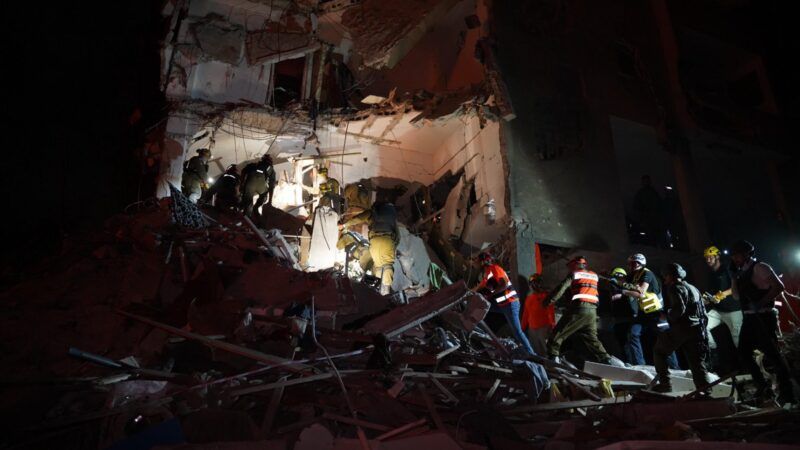Trump's Iran War Would Not Be a One-Off Deal
Neither American hawks nor Israeli planners intend on allowing for a simple, quick U.S. intervention in Iran.

President Donald Trump is considering joining the war that Israel started with Iran. Although his administration immediately downplayed its role in the Israeli surprise attack last week, Trump has gotten increasingly enthusiastic about the war, as U.S. military forces move into the region.
"I may do it, I may not do it," he told reporters on Wednesday.
The decision is between Trump and the Israeli government alone—and not Congress or the American people—as Vice President J.D. Vance implied on Tuesday. And Trump may believe that a U.S. intervention would be a simple, short affair. According to The New York Times, he was swayed by Fox News coverage portraying Israeli successes in the first day of the war.
Supporters of U.S. involvement have been arguing that the U.S. only needs to strike Fordo, the underground nuclear facility that Israel cannot reach. And Trump may be under the impression that he can cleanly extricate U.S. forces if the war drags on, as he did in Yemen.
But Iran is not Yemen. It has the ability to kill American troops, which would make a quick exit from the war politically untenable. And a catastrophic Iranian collapse would likely lead to calls for even more, long-term intervention.
While Iran is limited in the damage it can do to Israel because of distance and layers of Israeli and American air defenses—which are both reportedly running low on ammunition—the U.S. military is a much more inviting target. U.S. intelligence knows that Iran has short-range missiles poised to hit U.S. bases in the Persian Gulf, according to The New York Times.
Iraqi guerrillas are also reportedly poised to attack American troops in Iraq (yes, they're still there) in the event of a U.S. intervention. Ironically, the last ground war in Iraq was exactly what Trump ran against in 2016.
Of course, the United States could ultimately prevail in a total war. And that would still not be the end of it. Iran does not have a unified government-in-exile ready to take the reins after a forcible regime change. The situation would likely look like Iraq from 1991 to 2003 or Syria from 2011 to 2024, with the U.S. military playing permanent crisis management.
Israeli strategic doctrine, which has been driving events, is to keep wars going indefinitely. The Israeli military refers to its operations in the Palestinian territories as "mowing the lawn" and its operations in Syria as the "war between the wars." In American politics, that might be called "endless war."
Those who insist that the U.S. can simply bomb Iran's nuclear program will likely push for further and longer intervention whenever the opportunity arises. Hawks have a tendency to argue for escalation no matter what happens. When Iran looks strong, they claim that U.S. pressure is the only thing holding back this global threat, and when Iran looks weak, they claim that the U.S. should press its advantage.
For years, neoconservatives insisted that they didn't want a regime-change war with Iran, only leverage for a better deal. And until a few days ago, American supporters of Israel—from liberals such as Jeffrey Goldberg to conservatives such as Glenn Beck—insisted that they would never ask American troops to risk their lives in Israel's defense.
Yet hawks have quickly turned to arguing in favor of both of those outcomes. In fact, former Israeli defense Yoav Gallant told CNN on Monday that the United States has an "obligation" to join the Israeli war and "make sure that the region is going to [sic] a positive way." Not an interest—an obligation. It's not hard to see how the goalposts will shift in the near future.
Outside of Washington, there is not a clear popular mandate for war. Unlike the Iraq War in 2003, which took months of panicked (and dishonest) rhetoric from media and the administration to build consent for, the Iran War has been imposed on America as a surprise fait accompli.
Reps. Thomas Massie (R–Ky.) and Ro Khanna (D–Calif.) have proposed a war powers resolution to at least deliberate before going to war, an outcome hawks are in a rush to avoid. No wonder why. A recent poll shows that only 16 percent of Americans, including 23 percent of Republicans, want to be involved in the Israeli-Iranian conflict.
The same poll shows that a majority of Americans, with similar numbers across party lines, support negotiations with Iran over its nuclear program. There was another round of talks scheduled over the weekend, canceled due to Israel's surprise attack.
There is still an opportunity to pull back from the brink. Despite claims that the U.S. and Israel are working as one hand, Iran has shown a willingness to separate the two actors and reengage with the U.S. directly. Trump can play mediator from the outside, as he has in other conflicts.
But first, he has to reject the temptation to join the war himself. And in the long run, it's worth thinking about taking back the decision over war from a foreign government so eager to drag the U.S. in.


Show Comments (122)